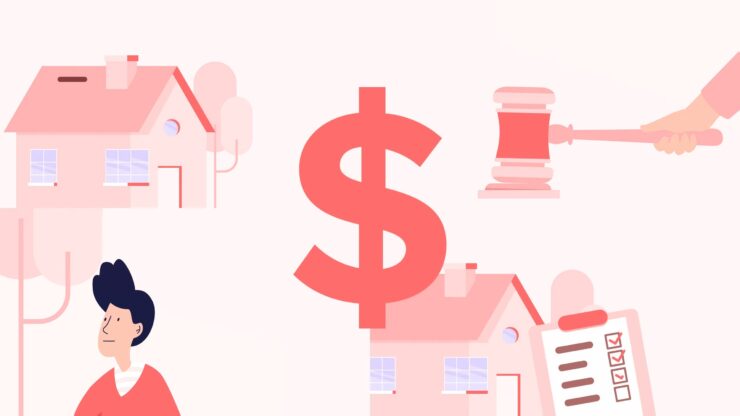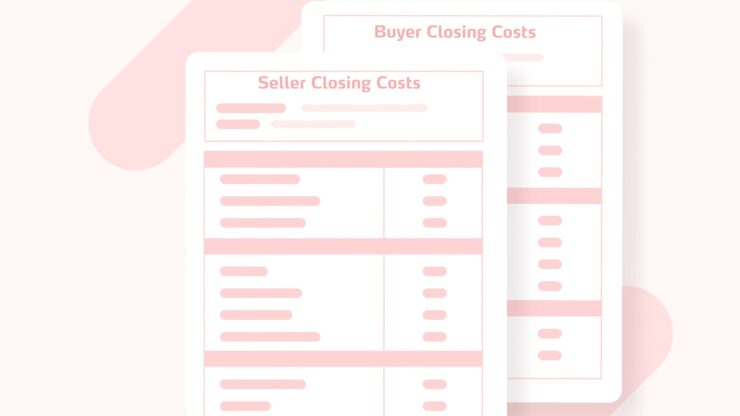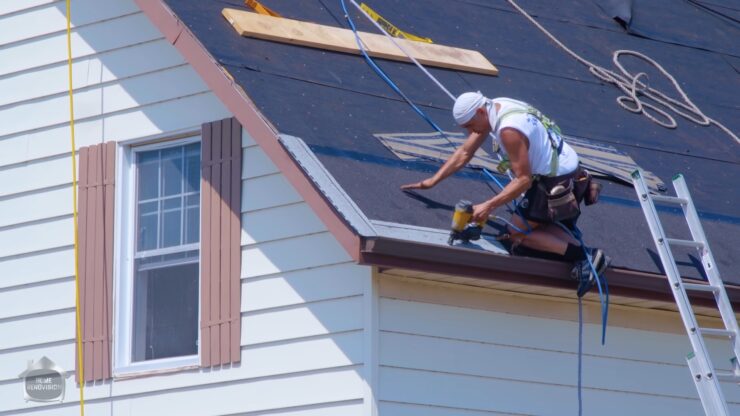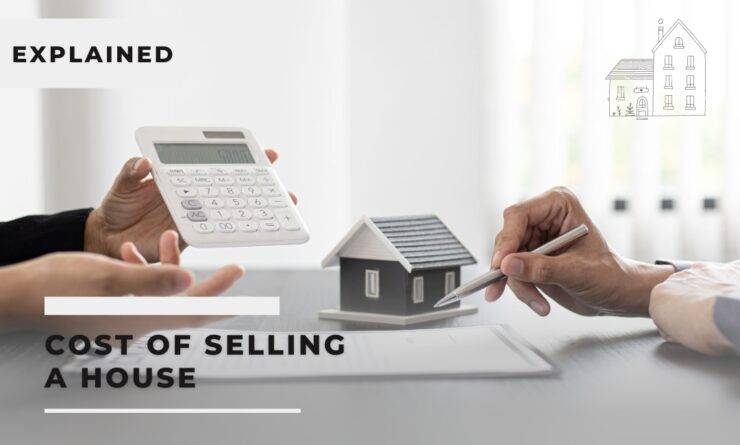Selling your home? Strap in for an adventure on the expense roller coaster! While visions of hefty sale profits might dance in your head, remember there’s a backstage crew waiting to be paid.
Picture this: You’ve got a grand cake that represents the purchase price of your home. Before you get to savor it, you’ll have to share a slice (around 5%) with your real estate agent for their stellar performance. Then come the little nibblers – attorney fees, notary charges, and title-related costs – each taking their own mini bites.
And don’t forget! Depending on your home’s location, you might have some unexpected guests like property and transfer taxes. Plus, if you’ve got a mortgage, they’ll want a small cut for their closing act.
So, before you break out into a victory dance, make sure you’ve tallied up all these costs. That way, when you gaze at the final piece of your cake, you won’t be left scratching your head, wondering where the rest vanished. Here’s to a successful and surprise-free sale!
Ready to Dive Into the World of Real Estate Commissions? Let’s Break It Down!

The big kahuna of seller fees is the real estate commission. Historically, this has hovered between 5% to 6% of your home’s sale price. So, for a home selling at $300,000, you might be waving goodbye to a cool $18,000. Ouch!
Now, here’s the twist: this commission gets divided between two stars of the show – the seller’s agent and the buyer’s agent. And guess who usually foots the bill?
Yep, the seller. But don’t lose hope! You might have some wiggle room to negotiate a smaller slice for the agents, especially if your home is the belle of the ball, the market’s sizzling, or your home’s price tag is on the higher side.
Some homeowners, eager to dodge this commission bullet, opt to go solo, listing their homes as “For Sale By Owner” or FSBO. Sounds tempting, right? But here’s the catch: you’ll have to wear the agent’s hat, doing everything from wooing potential buyers to handling all the nitty-gritty paperwork.
Lastly, an agent isn’t just about the sale. They’re your market guru, guiding you on when to list your home so it doesn’t just sit there collecting cobwebs. Because if it does, you might find yourself juggling costs like mortgage payments and HOA fees on two homes. And that’s a juggling act no one wants!
The Inescapable Costs of Selling Your Home
Selling your home? Brace yourself for some unavoidable expenses that will nibble at your net gains. While not all of these may apply to every sale, when they do, they’re pretty much set in stone.
1. Closing Costs

Ah, the grand finale of the home-selling process! While many of these costs are typically shouldered by the buyer, sellers aren’t off the hook. Sometimes, you might find yourself chipping in for some of the buyer’s expenses.
This practice has been a bit of a rarity in the recent seller-favored markets, but as sales are showing signs of slowing down, it might become more of a norm. Here’s a number to chew on: in 2021, the average closing costs for a single-family home stood at $6,905, as per ClosingCorp.
What might these costs entail for sellers?
- HOA Fees: If your property is part of a Homeowners Association, there might be fees to settle.
- Pre-listing Inspection: A thorough check-up of your home before it hits the market.
- Recording and Settlement Fees: Costs associated with legally documenting the sale.
- Title Insurance: A policy that protects against disputes over the ownership of the property.
- Escrow Fee: A fee for the third party that holds and regulates payment of the funds required for two parties involved in a given transaction.
- Brokerage Fee: The fee you pay to the brokerage for their services.
- Courier Fee: Costs for transporting documents or other important items during the transaction.
2. Utilities
Even if you’ve moved out, keep those lights on! A dark, cold, or sweltering house isn’t appealing to buyers. While you won’t be there using the utilities, it’s essential to maintain them. The good news? With no one home, your bills should be lower.
3. Mortgage Payoff

The money from your sale will first go towards clearing your mortgage. However, the amount you see on your statement might be slightly less than what’s due. Remember to factor in accrued interest and potential prepayment penalties.
4. Capital Gains Taxes
Sold your home for more than you bought it? That’s a capital gain. If it’s above a certain amount, it’s taxable. However, many homeowners can exclude up to $250,000 ($500,000 for couples) from their taxes if they’ve lived in the house for at least two of the past five years. If you’ve rented it out, it’s best to chat with a tax expert.
5. Property Tax
Usually paid upfront, sellers should cover their prorated share up to the closing date. But if you’ve overpaid for the year, you might get a rebate at closing. The buyer will cover the rest.
6. Transfer Tax

It’s not just about property taxes. Some places charge a tax when the property changes hands. This varies by location and is typically a small percentage of the sale price. And for those luxury homes? Some states slap on an extra ‘mansion tax’.
7. Moving costs
If you’re selling your place, you’re going to have to move all your stuff. Paying for that will set you back between $911 and $2,514, according to HomeAdvisor. However, that price tag can be a lot more if you’re moving several rooms’ worth of furniture or if you’re moving across the country.
If you want to save money on your moving costs, you can consider doing it yourself. Be honest, though. Can you manage all that heavy lifting? You might save money on the move, but you also might need to pay for a massage and take some days away from work after it, too.
The “Might-Have” Costs
While there are certain costs you can’t dodge when selling your home, there are others that are more like a la carte menu options. They might cost you upfront, but they could potentially sweeten the deal or even boost your sale price.
1. Pre-sale Home Inspection:
Think of this as a health check-up for your home. For around $340, as per HomeAdvisor, you can get a heads-up on any lurking issues. Why? To tackle them before a buyer spots them. It’s like fixing a chipped tooth before a big date. But remember, if you uncover significant issues, you might be legally bound to spill the beans to potential buyers.
2. Home Warranty Policies:
This is like offering a safety net to your buyer. It covers appliances and systems, giving the buyer peace of mind, especially if your home has seen a few seasons. The price varies, ranging from $222 to $1,850 according to HomeAdvisor, but it’s like wrapping your home in a bow, making it even more appealing.
3. Seller Concessions:
Sometimes, buyers might ask for a little help with their closing costs. This could be a contribution towards appraisal fees, title insurance, or other costs. It’s like chipping in for a group dinner.
You don’t have to, especially if you’re in a seller’s market. But in a buyer’s market, this gesture might just seal the deal. However, there are rules on how much you can chip in, depending on the buyer’s mortgage type and down payment.
4. Big Repairs:

If the buyer’s inspection unveils some skeletons in your home’s closet, like a leaky roof or plumbing woes, you might need to foot the repair bill to keep the deal alive. Or, you could offer a discount to the buyer to handle it themselves. It’s always good to be mentally (and financially) prepared for such surprises.
Home Improvements
Before you hang that ‘For Sale’ sign, you might ponder over giving your home a little facelift. Some renovations can indeed add value, while others might just burn a hole in your pocket without much return.
Simple tweaks, like sparkling windows or a manicured lawn, can sometimes make a bigger difference than major overhauls. But before you dive into any project, it’s crucial to consult with a real estate expert.
Charly Marggraf, a seasoned agent, warns, “Sellers often misjudge which improvements truly add value. They might splurge on fancy finishes or landscaping that doesn’t resonate with the average buyer. If you’re sprucing up to sell, always chat with a professional first.”
Home Staging
Think of this as setting the stage for a grand performance – your home’s debut to potential buyers. Staging can range from rearranging your existing furniture to renting upscale pieces to elevate your home’s appeal. While it comes with a cost, the investment can be fruitful.
NAR data reveals that for 15% of sellers’ agents, staging bumped up a home’s value by 6-10%. Plus, a beautifully staged home can be a magnet for quick offers, with 31% of agents noting that staging significantly reduced listing time.
Frequently Asked Questions
What is the biggest selling point of a house?
The biggest selling point often varies based on the market and buyer preferences, but typically, it’s the home’s location. A prime location, close to amenities, schools, and transportation, can significantly enhance a property’s appeal. Other major selling points include the home’s size, layout, condition, and unique features.
Who is the best to sell a house?
The best person to sell a house is usually a licensed real estate agent or Realtor with a proven track record in your specific area. They have the expertise, market knowledge, and resources to effectively market the property and negotiate the best price.
What are the 3 most common methods of selling property?
The three most common methods are:
- Private Sale: The owner markets and sells the property without the involvement of an agent.
- Real Estate Agent Sale: The property is listed with an agent who markets the home and negotiates on behalf of the seller.
- Auction: The property is sold to the highest bidder in a public setting, often used in hot markets or for unique properties.
Who buys the most real estate?
Institutional investors, such as real estate investment trusts (REITs), pension funds, and private equity firms, often buy significant amounts of real estate. However, individual homebuyers collectively make up a large portion of real estate purchases, especially in the residential market.
What is the most profitable way to sell my house?
The most profitable method can vary based on market conditions. Generally, making necessary repairs and upgrades, staging the home effectively, and pricing it competitively with the help of a knowledgeable real estate agent can maximize profits. Selling during a seller’s market, when demand is high and inventory is low, can also increase profitability.
Summary
Every home has its unique financial story, so it’s vital to crunch the numbers accurately when selling. Let’s visualize a scenario: Four years ago, you bought a property for $300,000.
You put down a 5 percent deposit, which was $15,000, leading to an initial mortgage of $285,000.
Fast forward to today, you’ve reduced the loan to $250,000. With the real estate market booming, your property’s current value is $365,000. Now, the question is, out of the $115,000 increase in value, how much will genuinely be in your pocket?













